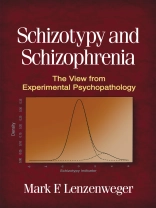This compelling book argues that all people with schizophrenia share a personality organization known as schizotypy. Presented is a novel framework for understanding schizophrenia through the study of individuals who may never develop the disorder, but who nonetheless harbor a liability for it. Mark F. Lenzenweger comprehensively reviews current knowledge about schizotypy while exploring broader questions of how to think about and conduct psychopathology research, making the book useful and relevant for both researchers and students. He demonstrates state-of-the-art strategies for combining clinical observations, psychometric and psychophysiological measures, neuroimaging, and genetic analyses, and for analyzing the results using advanced statistical techniques.
表中的内容
I. Schizotypes and Schizotypy
1. “Welcome to the Machine”
II. The Experimental Psychopathologist’s Toolbox
2. Reliability, Validity, and How We Collect Data
3. Practical Tools and Pragmatic Issues
4. Analytic Heuristics, Caveats, and Soapbox Moments
III. Schizotypy Viewed from the Laboratory
5. Recognizing the Schizotype
6. Begin with a Model
7. Genetics, Genomics, Phenotypes, and Endophenotypes: The Challenge of Complex Disease
8. Probing Critical Neurocognitive Endophenotypes: Attentional Dysfunction, Executive and Working Memory Functioning, Eye-Movement Dysfunction, and Thought Disorder
9. Motion and Touch: Simpler May Be Better
10. The Schizotype through Time…
11. Now, Just What about This “Type” Business in “Schizotype”?
IV. Reactions, Reflections, and Projections
12. Thoughts on Impediments, Imaging, Environment, Intervention, and Innovation
Appendix A. Summary Rating Sheet from Manual for Use with Checklist of Schizotypic Signs
Appendix B. Selected Quantitative Measures of Schizotypy
Appendix C. Getting Started: A Provisional Reading List
关于作者
Mark F. Lenzenweger, Ph D, is Distinguished Professor of Psychology at the State University of New York at Binghamton and Adjunct Professor of Psychology in Psychiatry at Weill Cornell Medical College in New York. Dr. Lenzenweger held a professorial post at Cornell University for 11 years, where he was a member of the tenured faculty. He moved on to Harvard University, where he chaired the Quantitative Methods Committee in the Department of Psychology, as well as helped to relaunch the clinical science program there. He returned to upstate New York to accept an interarea professorship in clinical science, cognitive science, and behavioral neuroscience in the Department of Psychology at the State University of New York at Binghamton and was promoted to Distinguished Professor in 2007. Dr. Lenzenweger has been recognized as a Distinguished Investigator by NARSAD: The Brain and Behavior Research Fund and is a Fellow of the American Psychological Society and the American Psychopathological Association. Widely published, he maintains active research programs in three areas: schizotypy and schizophrenia, longitudinal study of personality disorders, and quantitative methods. He also continues to see patients in long-term psychotherapy in private practice.












